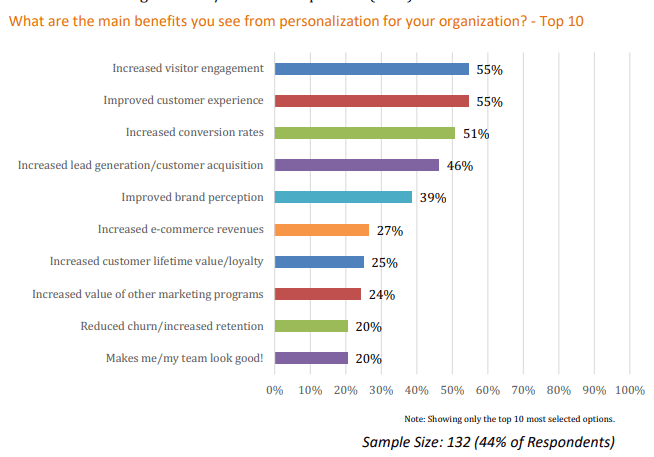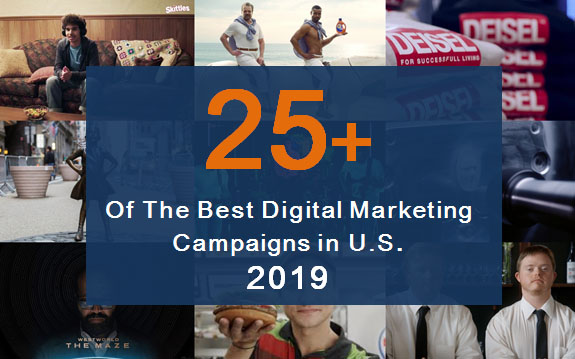This Is How Machine Learning Is Reshaping Your Marketing in 2019
Data-Driven Marketing | Jun 22, 2019
It is no secret that in recent times, machine learning (ML) and marketing go hand-in-hand. In the new digital marketing era, to do one without the other is a mistake no business can really afford, especially if they want to remain competitive.
But marketing with machine learning is only possible with data…
For businesses today, being able to anticipate customer behavior is key to optimizing marketing campaigns. So, there is an increased reliance on data.
Machine Learning as a Service (MLaaS) market supposed to expand to $7.6 billion by 2023, according to Stratistics MRC. A recent study revealed that 92% of Big Data and AI Executives are increasing their pace of investment in big data and artificial intelligence (AI) in 2019, with 62% of them have already seen significant results from their investments in big data and AI. Another study conducted by Evergage showed that 42% of marketers not using machine learning/algorithmic plan to do in the next year.
The question though is “How can you use machine learning in 2019 to make yourself a better marketer?”
In this article, we’ll explore just how machine learning can help businesses improve and enhance their marketing efforts and how machine learning is reshaping marketing.
Artificial Intelligence (AI) Vs. Machine Learning (ML) What’s the Difference?
Basically, “Artificial Intelligence” and “Machine Learning” are the terms of computer science. Artificial intelligence has a broader meaning. It’s the idea that computers and other machines can complete tasks normally requiring human intelligence.
The concept behind machine learning is that a computer can learn by its own without being explicitly programmed from the data it analyzes by identifying patterns. Ultimately, this technology can make decisions without humans.
Finally, we can say that machine learning is a branch of artificial intelligence, and it automates model building for data analysis. While AI and ML are often used interchangeably, they are not the same.
How Machine Learning is Reshaping Marketing 2019
1. Improve Customer Experience Strategy
Machine learning can help improve and even personalize every aspect of a user’s experience (UX)—from successfully surfacing relevant products/services to offering key moments of delight along the way. Simply, it can help customers find exactly what they want, even if they don’t know what they want.
Machine learning can enhance the customer’s online shopping experience in several ways, including:
- Mapping and guiding the buying journey, making personalized product recommendations to help the customer find exactly what they want;
- Ensure your online store never runs out of stock or provides alternatives in case stock is low; and
- Provide customers with a 24-hour support service.
- Allows customers to do what they do best. For example, chatbots can deal with routine queries such as “how do I reset my password” and “can I get these shoes in black,” so customers don’t have to queue for an answer that could be provided in seconds by a bot.
According to a study conducted by 2Checkout, 33% of ecommerrce companies worldwide indicated that offering a great customer experience is their top priority in 2019. Most of these companies are planning to use machine learning and marketing automation to provide a better customer experience.

A Figure Shows the Use of Marketing Automation and Machine Learning in eCommerce
2. Providing Smarter Segmentation
Audience segmentation continues to grow in complexity as a result of the wealth of data forms available to business intelligence, CRM, and data science teams. Audience segments can be built using demographic, behavioral data, implicit preference data, explicit preference data, and even predicted behavioral data such as the propensity to purchase in the next 24 hours, the predicted average order value, and the propensity to opt-out of communications.
This attribute bloom is highly valuable, but it also presents a level of complexity far greater than traditional frequency, recency, monetary value segmentation, and other similar segment modeling techniques.
Strong performing segments take time to identify and test, but using machine learning and AI, marketers can assemble super segments using a wide variety of criteria without creating risk. For instance, machine learning models (MLM) can train and test segments on historical campaign data to identify attributes of those who previously converted on marketing campaigns similar to those planned to launch.
More broadly speaking, artificial intelligence can be used to analyze vast troves of performance data to identify top audience segments and match those with the content they respond to most as a means for impacting future marketing strategy.
3. Improve Customer Personalization
Imagine that, you’ve received an email, visited the website and bought a product. Then, you are programmatically attacked with undesired advertising emails that contain unnecessary data in most cases. Such spam messages usually are un-personalized. So, it causes your irritation.
Undoubtedly, the advent of AI and ML will change everything in the blink of an eye. Through hiring machine learning specialists, brands will be able to more precisely define customer personas.
According to BrightEdge, consumer personalization is the most important big trend in digital marketing, followed by artificial intelligence and voice search. Increasing visitor engagement (55%), improving customer experience (55%) and improving brand perception (39%) are the top three benefits of personalization, according to Evergage.
Nearly three-quarters of marketers believe that personalization has a “strong” or “extreme” impact on advancing customer relationships.

A Figure Shows the Top 10 Benefits of Personalization
4. Better and Easier Content Optimization
Every marketer knows the importance of compelling subject lines and push notification content. But what’s click-worthy to one may seem utterly boring for another.
Whether it’s email subject lines, an article headline, o Facebook ad graphics, A/B tests allow marketing departments to try out various options and garner the results to determine which connects will be the best with the audience.
Moreover, companies can use the feedback to provide more targeted content, ultimately collaborating with machines to optimize content and services. This method of using machine learning in marketing proves valuable with segmented marketing campaigns.
Probably the best example of this is Google RankBrain. Its great ability to learn from the searcher intent has made Google an incredibly efficient service, consistently improving in the accuracy and efficiency of its results depending on the context of each query.
Related Article: An Introduction to Using A/B Testing for Marketing Optimization
5. More and Better Targeted Recommendations
With AI an ML organizations can create “reverse recommendations” that enable marketers to identify the right audience for a specific set of products they are working to prioritize based on margin, inventory, or a multitude of other variables.
The retail giant, Amazon, has harnessed the power of machine learning, with 35% of its annual revenue generated through personalized product recommendations.
Using this approach in tandem with traditional recommendations, where marketers can automate recommendations to individuals within a pre-defined audience, has the potential to dramatically boost revenue gains from this basic form of personalization.





